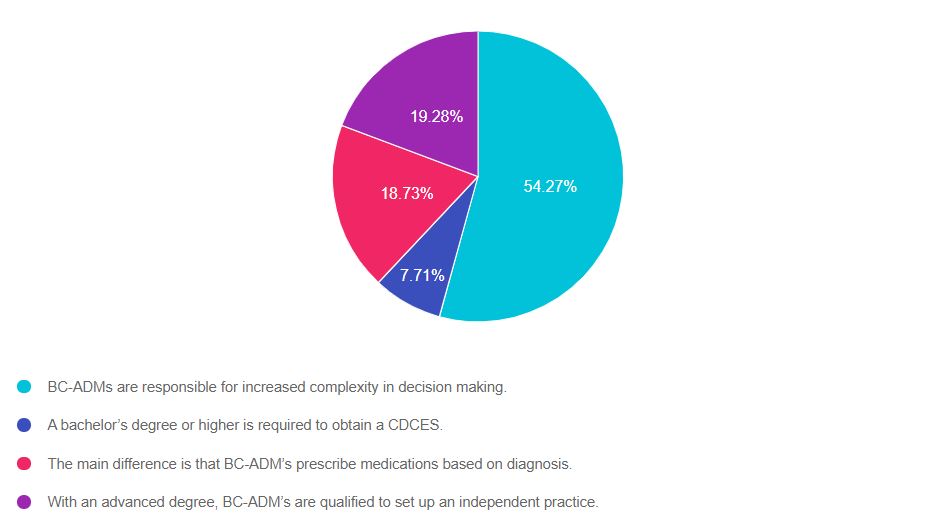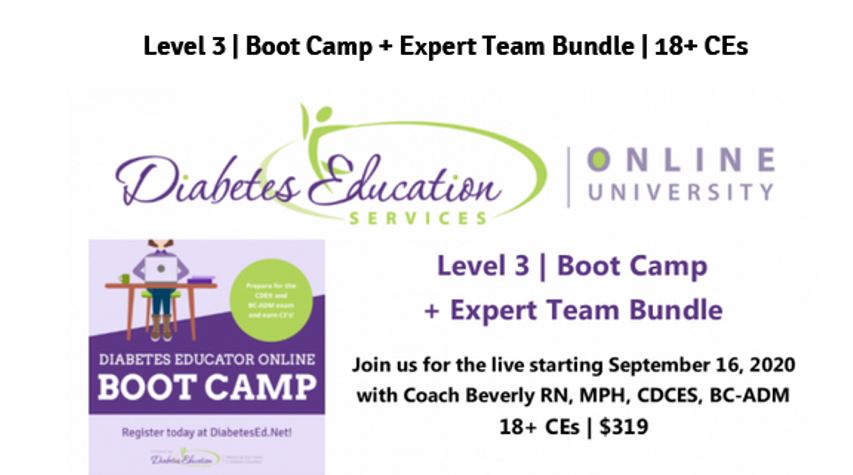
Our August 18th Question of the week quizzed test takers on the difference between a CDCES and BC-ADM. Although 54% of respondents chose the correct answer, 46% did not. We thought that this was an important topic to discuss further, so we can pass on correct info to people living with diabetes.
Before we start though, if you don’t want any spoilers and haven’t tried the question yet, you can answer below: Answer Question
Question: What best describes the difference between a Certified Diabetes Care and Education Specialist (CDCES) and a person Board Certified in Advanced Diabetes Management (BC-ADM)?
Answer Choices:
- BC-ADMs are responsible for increased complexity in decision making.
- A bachelor’s degree or higher is required to obtain a CDCES.
- The main difference is that BC-ADM’s prescribe medications based on the diagnosis.
- With an advanced degree, BC-ADM’s are qualified to set up an independent practice.

As shown above, the most common choice was option 1, the second most common answer was option 4, then option 3, and finally option 2.
Interested in achieving your CDCES or BC-ADM? Click here to get started.
Getting to the Best Answer
If you are thinking about taking the certification exam, this practice test question will set you up for success. Test writers anticipate possible answers based on the details in the question. They will wave those “juicy answers” right under your nose. Your job is to weed through the particulars, pluck out the most important elements and choose the BEST answer. And remember, sometimes the simplest answer is the best answer.
Answer 1 is correct. 54% chose this answer. “BC-ADMs are responsible for increased complexity in decision making.”
According to the ADCES website:
“The BC-ADM skillfully manages complex patient needs and assists patients with therapeutic problem-solving. Within their discipline’s scope of -practice, healthcare professionals who hold the BC-ADM certification adjust medications, treat and monitor acute and chronic complications and other comorbidities, counsel patients on lifestyle modifications, address psychosocial issues, and participate in research and mentoring.”
Answer 2 is incorrect. 8% of you chose this answer. “A bachelor’s degree or higher is required to obtain a CDCES.”
Eligibility to take the exam is based on licensure, registration, or certification. According to the CDCES website, the following health care professionals meet the discipline requirement.
- Clinical psychologist
- Occupational therapist
- Optometrist
- Pharmacist
- Physical therapist
- Physician (M.D. or D.O.)
- Podiatrist
- Registered nurse (includes nurse practitioners and clinical nurse specialists)
- Dietitian or dietitian nutritionist holding active registration with the Commission on Dietetic Registration
- PA holding active registration with the NCCPA
- Exercise physiologist holding active certification as an American College of Sports Medicine Certified Clinical Exercise Physiologist (ACSM-CEP®)
- Health educator holding active certification as a Master Certified Health Education Specialist from the National Commission for Health Education Credentialing
- Master’s degree in social work
Answer 3 is incorrect. About 19% of respondents chose this. “The main difference is that BC-ADM’s prescribe medications based on the diagnosis”.
The BC-ADM is a certification exam and it does not confer prescriptive authority. Only those with certain licenses can prescribe medications, and the regulations can vary from state to state. For example, I am a Registered Nurse with a Masters in Public Health. I also have my CDCES and BC-ADM. As a licensed RN, I do not have prescriptive authority. Certification does not change your scope of practice and can come from different organizations. Licensure comes from governmental authority.
Finally, Answer 4 is incorrect. 19% chose this answer. “With an advanced degree, BC-ADM’s are qualified to set up an independent practice.”
This is a juicy answer but is not correct. Let’s say I want to set up shop as a Registered Nurse with a Masters in Public Health. I also have my CDCES and BC-ADM. Even with my BC-ADM, I couldn’t bill for services, and under whose oversight would I see people with diabetes and make treatment recommendations?
Again, it’s not the BC-ADM that creates the opportunity to set up an independent practice. As a licensed RN, I can’t set up an independent practice and bill for my services in my state. Certification does not change your scope of practice and can come from different organizations. Each state’s licensure and scope of practice regulations come from a governmental authority. We must practice within the legal parameters of our scope of practice based on licensure.
Interested in achieving your CDCES or BC-ADM?
Click here to get started.
We hope you appreciate this week’s rationale! Thank you so much for taking the time to answer our Question of the Week and participate in this fun learning activity!
Studying for the CDCES or BC-ADM exams?
Our Summer 2020 Certification Boot Camp begins September 16th!

In each webinar, either Coach Beverly, Dr. Isaacs, or Ms. Armstrong, highlight the critical content of each topic area, so you can focus your study time most efficiently. They also launch multiple poll questions to help participants focus on key concepts and assess their knowledge while learning the best test-taking strategies.
2020 Boot Camp Live Stream Webinar Schedule with Coach Beverly
All courses air at 11:30 a.m. (PST)
- Diabetes – Not Just Hyperglycemia | Sept 16
- ADA Standards of Care | Sept 23
- Insulin Therapy – From Basal/Bolus to Pattern Management | Sept 30
- Insulin Intensive – Monitoring, Sick Days, Lower Extremities | Oct 7
- Meds for Type 2 | Oct 14
- Exercise and Preventing Microvascular Complications | Oct 21
- Coping & Behavior Change | Oct 28
- “The Big Finish” Test Taking Boot Camp | Nov 4
Can’t make it live?
No worries! All video presentations and podcasts will be available now on-demand.
Sign up for Diabetes Blog Bytes – we post one daily Blog Byte from Monday to Friday. And of course, Tuesday is our Question of the Week. It’s Informative and FREE! Sign up below!
[yikes-mailchimp form=”1″]Accreditation: Diabetes Education Services is an approved provider by the California Board of Registered Nursing, Provider 12640, and Commission on Dietetic Registration (CDR), Provider DI002. Since these programs are approved by the CDR it satisfies the CE requirements for the CDCES regardless of your profession.*
The use of DES products does not guarantee the successful passage of the CDCES exam. CBDCE does not endorse any preparatory or review materials for the CDCES exam, except for those published by CBDCE.
[yikes-mailchimp form=”1″]








